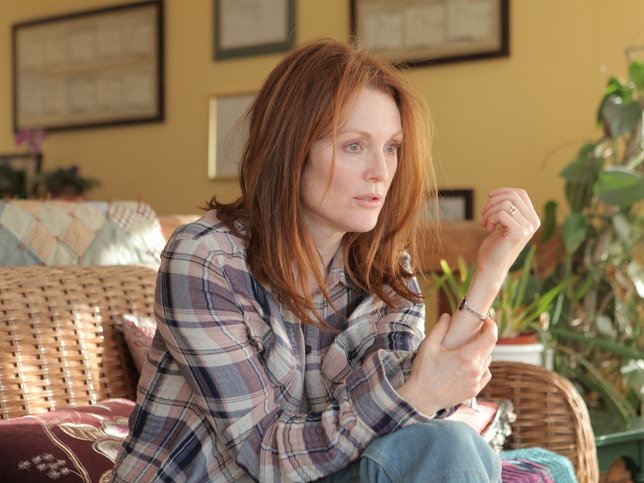It starts out innocently enough: not quite keeping up with conversation at a family dinner, or a word just dangling out of reach during a presentation before quickly redirecting to a different one. Then it becomes events slipping out of mind. Then more and more items and locations go missing or become a confusing mystery. Then more words vanish. Some of those disappearing words become names. Soon, familiar faces become strangers: those you call friends, those you call family and then seemingly yourself.
The events of the Alzheimer’s drama "Still Alice" read like an intimate horror movie, a real life Marty McFly nightmare of fading out of existence with no hope of stopping or turning back the clock. Only occasionally in the film do they truly play that way.
At its best, Richard Glatzer and Wash Westmoreland’s film – based on the novel by by Lisa Genova – unsentimentally captures the quiet terror of the disease and one’s own crushing dissolve from life and from those they love. More often than not, however, "Still Alice" feels a little cozy, a touch too gentle considering what’s going on, the silent destruction and devastation taking place. While our titular character fights Alzheimer’s, another battle is taking place, pitting the cruel reality of the film’s subject matter against its sometimes soft tear-jerking execution. To borrow one of the lead’s quotes, it doesn’t suffer, but it does struggle.
Luckily, in the war between honesty and artifice, "Still Alice" has a pretty phenomenal performance in the former’s corner.
Newly anointed Oscar winner Julianne Moore stars as Alice, living what many would consider the good life. She’s got a nice home. She’s one of the country’s leading scholars in the subject of linguistics and communication. She has a pleasant marriage (Alec Baldwin plays husband) and three happy grown-up kids – even if the youngest (a rather impressive Kristen Stewart) and her poor, fledgling acting career isn’t exactly Alice’s favorite.
Things, however, quickly and quietly take a turn for the worse. While talking to a class of students, the word "lexicon" escapes Alice. For her, it doesn't as much escape as it was like the word wasn’t even there to begin with, leaving an empty void in its place. She gets lost jogging on the very campus she works at, events slip her mind and she now has to look up favorite family holiday recipes.
Fairly well versed on the workings of the mind, Alice figures it might be a tumor of some kind, but the actual diagnosis (delivered in a long take) comes as a shock: early onset Alzheimer’s, a disease that can be passed down to her children and their children as well. She tries to keep her brain working and stimulated making memory tests for herself in the hopes of perhaps fighting through the ailment – or at least holding it off for a while – but it soon begins its brutal toll.
Things go missing. The shampoo winds up in the fridge. She can’t find the bathroom in her own house before having to wet herself; other rooms quickly follow. She thinks she found her cell phone after a day gone missing; in reality, it’s been gone for weeks. She doesn’t realize she reads her daughter’s private diary. Her children’s names fade away. Soon, she follows, a confused distance growing between her and her loved ones. She can’t even kill herself because she struggles to remember the pre-recorded instructions she left for herself when lucid.
It’s a role that, in the wrong hands, could be easily overdone, hammy and awards bait approved. Moore, however, makes it quietly powerful and deft – important since so much of the movie rests solely on her shoulders.
Early on, her confusion is slight, more of an annoyance than a concern. As the doctor’s visits pile up and the diagnosis comes down though, she soon becomes a mix of strength and increasingly apparent brittleness, cracking and splintering from the growing pressure. You see and feel Moore bristling at the idea of falling apart, of her former accustomed life vanishing and becoming her exact opposite – someone no longer in control, someone growingly dependent. She’s often unpleasant, but Moore – sometimes a bit much in certain roles, but here perfectly easy and natural – always lets the audience into the emotions of the struggle without overdoing them.
The hardest part, however, comes near the end, with her brain nearly vacant and only remnants remaining. With the role becoming nothing, the risk is to overplay the confusion and vacancy, to become a wide-eyed, yelling, confused caricature. That’s how a movie like this becomes a Lifetime Special very fast. Moore plays it just the right amount: a shell of her former person, but still a person. Empty, but you can see the gears working, just no longer clicking into place. She doesn’t overplay, mostly because her character doesn’t know. Unawareness fast becomes Alzheimer’s most sinister weapon.
It’s a very strong – and, now that it will annoyingly forever become its barometer, award worthy – performance, one that carefully marks the tragic downward trajectory of a person’s collapse, but with the word "person" always the underlined part.
The movie around her, however, doesn’t quite manage to get up to her level. It’s far from a misfire. The script is far from rote, chronicling the deterioration with a fair amount of nuance, detail and mostly without sentimentality, and the direction from Glatzer and Westmoreland is intelligently done. Their use of shallow focus throughout the film – leaving Moore clear but everything else a foggy blur – and the jumpy, inconsistent timeline are cleverly used, nicely visualizing the character’s growingly confused, disoriented mentality.
It’s smartly done – if also stolid. For everything "Still Alice" does well – namely Moore – the movie as a whole struggles to connect. Starting from the opening moments establishing Alice as a leading scholar – as though the writers' thought Alzheimer's alone wasn't quite sad enough and needed more tragic irony – there’s just something about the movie that just rings synthetic and, in the end, soft. For all its honesty, "Still Alice" also feels cozy, like many of its difficult edges and sharp angles have pillows and bumpers for audience protection.
It’s gentle, bordering on flimsy, and add in some large segments of informational dialogue that sound oddly technical, the movie almost feels like a PSA: a nobly intentioned product for awareness while drama or cinema come in far second.
Thanks to Moore, "Still Alice" is a noteworthy movie. Otherwise, I’m afraid it’d fade away.
As much as it is a gigantic cliché to say that one has always had a passion for film, Matt Mueller has always had a passion for film. Whether it was bringing in the latest movie reviews for his first grade show-and-tell or writing film reviews for the St. Norbert College Times as a high school student, Matt is way too obsessed with movies for his own good.
When he's not writing about the latest blockbuster or talking much too glowingly about "Piranha 3D," Matt can probably be found watching literally any sport (minus cricket) or working at - get this - a local movie theater. Or watching a movie. Yeah, he's probably watching a movie.







